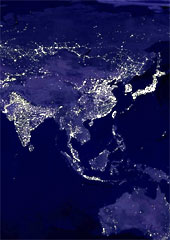Asia’s Austerity: The New Global Norm
Is austerity the only way to ensure that development is globally sustainable?
June 29, 2012

If, given the imminent rise of Asia, the world wants to avoid a bleak future, austerity has to be the new global norm. While that suggestion may provoke consternation in many the world’s leading economists, it is still the only way to address global inequalities — which these prominent economists at least profess to care about deeply.
But one should not expect any miracles — or much support, for that matter — from the West, given its politics, ideological biases and sense of entitlement. The West’s inability to come to terms with required changes should not put off Asian leaders from understanding the harsh realities ahead.
Asia needs to build its future on austerity because it can — and because it has no choice. That is a simple but inescapable function of the population and resource pressures that shape the fate of this vast continent — and hence the world as a whole.
Asia must reject the largely academic discussion taking place in the West about how to stimulate growth through debt (through the printing of money like there’s no tomorrow). Denial of underlying economic realities in the West, and in particular the United States, must not be mistaken in Asia as an apparent search for clever solutions, the finding of which, according to the script, is supposedly only a matter of time.
That is largely a rhetorical device, as the will to reorient the entire economy toward a more resource-preserving economic model (and therefore one in which people live within their means) is unlikely to be accepted in the United States in the near future. The truth is that many Americans are indeed too poor but still too resource-demanding for the country to make that turn.
That is why Asia needs to look at building human progress by reshaping capitalism around “austerity for all.” It is not so much a matter of economic models but of coexisting with resource constraints — and thus global responsibility built around discipline, which is the cornerstone of austerity.
Only this made-in-Asia drive toward austerity can address the needs of a majority of the world’s population that at present live beneath any fair definition of “austerity” in the West. In other words, what is perceived in the West as creating the conditions for social stability pales by comparison to how most people around the world live.
For governments, achieving this transformation is the key to legitimacy, irrespective of the type of political system they represent. Accordingly, Asian governments should stop pandering to Western pressure to do it their (Western) way — read: depending on free markets, capitalism and “democratic” institutions that allow private enterprise a free hand.
The clear lack of understanding in the Western world with respect to how Asia will have to deal with the challenges of population growth, climate change, technological changes and the discrediting of the Western economic model should give Asian leaders incentive enough to search for relevant answers among themselves.
How China and India, with their very different political systems, address these unique challenges, how they take steps to move away from the firm grip of the predominant Western consensus on growth (along with its dominance of global institutions and its emphasis on resource consumption) will be the most critical factor in how the world manages the challenges posed by the unique nature of the 21st century.
At the core of the austerity-minded capitalism for Asia will be a need to redefine human rights around the “right to live.” This will entail starting with equal access to resources and making collective welfare a priority over individual rights.
In this definition of growth, conventional wisdom gets challenged and ideas get transformed. For example, car ownership — essentially a free ride on underpriced fuel, roads, air pollution, etc. — cannot be viewed as an individual’s human right as it has been in the West. Mobility should be more appropriately priced.
Science will also need to be put at the forefront of decision making. That is the only approach that can provide a path to more equitable societies. Only then can economics continue to play a vital role, for it means abandoning the effort to deny that markets are social constructs and thus manipulated by vested interests. These are structures that can be — and urgently must be — changed.
Science working in tandem with an economics discipline reinvented in that manner will also allow us to measure progress not only in narrow terms such as GDP, but in terms that realistically account for the economic value of the ecosystem. This is the only way to end the systematic underpricing of resources. And it will allow for prosperity to occur globally without also stripping people of one of their most basic rights — the shared access to resources.
Lastly, because this will be a sharp departure from the Western ideological premise and its legitimacy, it will be wise of Western leaders to come to the realization that it is in their interest too for Asian countries to reshape capitalism and create different models to suit their own needs.
For the West, that will mean a profound change in attitude — less preaching, more listening and not using its “soft” power to derail new ideas because they don’t fit the Western mold.
Editor’s note: This essay was adapted from the author’s presentation at the 2011 Salzburg Trilogue. Hosted by the Bertelsmann Stiftung in Germany, the Salzburg Trilogue facilitates international cultural dialogue by bringing together recognized public figures to consider matters of global importance.
Takeaways
The West's inability to come to terms with required changes should not put off Asian leaders from understanding the harsh realities ahead.
Asia needs to look at building human progress by reshaping capitalism around "austerity for all."
Car ownership cannot be viewed as an expression of an individual's human right as it has been in the West.
Read previous

Is the 21st Century the Asia Century?
June 28, 2012
